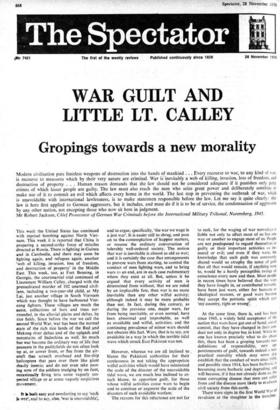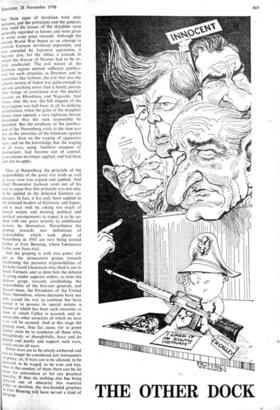WAR GUILT AND LITTLE LT. GALLEY
Gropings towards a new morality
Modern civilisation puts limitless weapons of destruction into the hands of mankind . . . Every recourse to war, to any kind of mar, is recourse to measures which by their very nature are criminal. War is inevitably a web of killing, invasion, loss of freedom, and destruction of property . . . Human reason demands that the law should not be considered adequate if it punishes only petty crimes of which lesser people are guilty. The law must also reach the men who seize great power and deliberately combine to make use of it to commit an evil which affects every home in the world. The last step in preventing the outbreak of war, which is unavoidable with international lawlessness, is to make statesmen responsible before the law. Let me say it quite clearly: this law is here first applied to German aggressors, but it includes, and must do if it is to be of service, the condemnation of aggression by any other nation, not excepting those who now sit here in judgment.
Mr Robert Jackson, Chief Prosecutor of German War Criminals before the International Military Tribunal, Nuremberg, 1945.
This week the United States has continued with reprisal bombing against North Viet- nam. This week it is reported that China is preparing a second-strike force of missiles directed at Russia. There is fighting in Guinea and in Cambodia, and there may soon be fighting again, and refugees again, another `web of killing, invasion, loss of freedom, and destruction of property' in the Middle East. This week, too, at Fort Benning, in Georgia, the courtmartial trial continued of Lieutenant William Calley, charged with the premeditated murder of 102 unarmed civil- ians, including a two-year-old child, at My Lai, just another village in South Vietnam which was thought to have harboured Viet- cong fighters. These villages are much the same, collections of huts and trees sur- rounded, in the alluvial plains and deltas, by rice fields. Since before the war we call the second World War, war has been the normal state of the rich rice lands of the Red and Mekong river deltas and of the uplands and mountains of Indochina as well. So much has war become the ordinary way of life that peasants in the paddyfields do not often look up at, or cower from, or flee from the air- craft that screech overhead and fire-ship helicopters that pass over them like giant deadly insects; and do not even take pass- ing note of the soldiers trudging by on foot, occasionally firing into some vaguely sus- pected village or at some vaguely suspicious movement.
his both easy and comforting to say `such Si war', and to say, also, 'war is unavoidable', and to argue, specifically, 'the war we wage is a just war'. It is easier still to shrug, and pass on to the contemplation of happier matters, or resume the ordinary conversation of tolerably well-ordered society. The notion that war is inevitable is almost as old as war; and it is certainly the case that arrangements to prevent wars from starting, to control the conduct of men fighting wars, and to bring wars to an end, are in each case rudimentary where they exist at all. But, unless it be argued that every activity of men is determined from without, that we are ruled by an implacable fate, then war is no more inevitable than any other wilful activity; although indeed it may be more probable than not. In fact, during this century, as during the previous one, major wars, far from being inevitable, or even normal, have been abnormal and improbable, as well as avoidable and wilful, activities; and the continuing prevalence of minor wars should not obscure this fact. Wars, that is to say, are avoidable in a way in which the terrible tidal wave which struck East Pakistan was not.
However, whereas we are all inclined to . blame the Pakistani authorities for their carelessness in not taking the appropriate wilful activities which would have minimised the scale of the disaster of the unavoidable tidal wave, we are much less inclined to at- tach blame, to apportion guilt, for those whose wilful activities cause wars to begin and to continue or augment the scale of the disasters of such avoidable warfare.
The reasons for this reluctance are not far to seek, for the waging of war nowadays is liable not only to affect most of us but one way or another to engage most of us. People are not predisposed to regard themselves as guilty or their important activities as im- moral or evil; and even if they were, the knowledge that such guilt was commonly shared would so atrophy the sense of guilt that all that would remain, if anything were to, would be a barely perceptible twinge of conscience every now and then. Most people in recent times have believed that the wars they have fought in, or contributed towards, have been just wars, either for humane or ideological reasons, or good wars because they accept the patriotic spirit which says `my country, right or wrong'.
At the same time, there is, and has been since 1945, a widely held acceptance of the notion that wars have got out of hand, out of control, that they have changed in their con- duct not only in degree but in kind. While no one has known precisely what to do about this, there has been a groping towards new definitions of responsibility, new aP- portionments of guilt, towards indeed a new practical morality which may some day establish that the conduct of wars since 1939. and possibly since 1914, has been barbaric. Is becoming more barbaric and degrading. and will become, if it has not already done so, the most corrupting disease that men can suffer from and the disease most likely to eradicate civil society from this earth.
There were signs in the first World War of revulsion at the slaughter in the trenches: but these signs of revulsion were only portents, and the politicians and-the generals
who were the of the slaughter were generally regarded as heroes and were given in many cases great rewards. Although the second World War began as an attempt to contain German territorial expansion, and was extended by Japanese aggression, it became also, for the Allies, a crusade in which the disease of Nazism had to be ut- terly eradicated. The evil nature of the German regime seemed sufficient justifica- tion for such atrocities as Dresden; and in somewhat like fashion, the evil (but also the yellow) nature of Japan was quite enough to prevent anything more than a barely percep- tible twinge of conscience over the nuclear assaults on Hiroshima and Nagasaki. And when, after the war, the full iniquity of the Nazi regime was laid bare, in all its stinking putrefaction, when the gates of the slaughter houses were opened, a very righteous horror demanded that the men responsible be punished. But the emphasis of the justifica- tion of the Nuremberg trials at the time was less on the atrocities of the Germans against the Jews than on the waging of aggressive wars; and on the knowledge that the waging of all wars, using 'limitless weapons of destruction', had become out of control. Conventions no longer applied, and had been seen not to apply.
Thus at Nuremberg the principle of the responsibility of the great war lords as well as lesser men was argued and applied. And Chief Prosecutor Jackson went out of his way to argue that this principle was not only to be applied to the defeated German ag- gressors. In fact, it has only been applied to the defeated leaders of Germany and Japan; and it may well be asking too much of human nature and existing political and juridical arrangements to expect it to be ap- plied with any great severity to undefeated nations, by themselves. Nevertheless the groping towards new definitions of responsibility which took place at Nuremberg in 1945 are now being carried further at Fort Benning, where Lieutenant Calley now faces trial.
And the groping is with two arms: for just as the prosecution gropes towards establishing the personal responsibilities of the baby-faced Lieutenant who liked it out in South Vietnam, and to deny him the defence of acting under superior orders, so does the defence grope towards establishing the responsibility of the five-star generals, and beyond them, the Presidents of the United States themselves, whose decisions have not only caused the war to continue but have caused it to possess its special nature, a feature of which has been such atrocities as those of which Calley is accused, and in- numerable other atrocities of which no man is or will be accused. And at this stage the groping must, thus far, cease, for to grope further must be to condemn all those who, thoughtlessly or thoughtfully, have and do defend and justify and support such wars, which means all wars. Either wars are to be utterly eschewed and can no longer be considered just instruments of policy; or, if wars are to be allowed, to be declared, to be waged, to be won and then in the conduct of them there can be no room for convention or for any practical morality. If they do nothing else but bring forward out of obscurity this essential e uner/or position, the two-handed gropings at Fort Benning will have served a kind of Purpose.















































 Previous page
Previous page